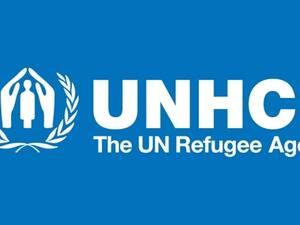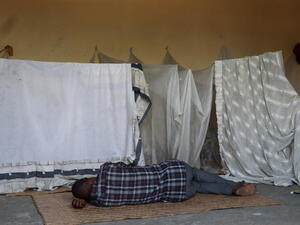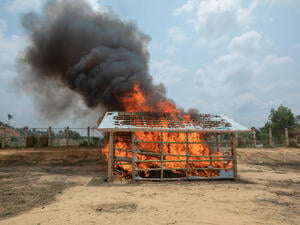Number fleeing Burundi to neighbouring countries tops 300,000
Number fleeing Burundi to neighbouring countries tops 300,000

Burundian refugees waiting in front of a bus at the Bugesera reception center to be relocated to Mahama refugee camp in Rwanda in this 2015 file photo.
GENEVA – The number of people fleeing violence, threats, extrajudicial killings, abduction, torture and persecution in Burundi has passed the 300,000 mark, UNHCR, the UN Refugee Agency, said today.
The grim milestone comes some 18 months after the political crisis in the central African nation erupted in April last year.
While departure numbers have generally not been as high as in 2015, there has been a constant flow this year, including more than 20,000 in July and August. Most are fleeing Kirundo, Makamba, Bujumbura city, Cibitoke and Rumonge provinces in search of asylum or international protection.
UNHCR expects numbers to continue rising in the remaining months of this year. However, there are fears that neighbouring Tanzania, Rwanda, Uganda and the Democratic Republic of the Congo and aid agencies including UNHCR will struggle to continue providing adequate shelter, protection and life-saving services.
“The reception capacities of these host countries are severely overstretched and conditions remain dire for many refugees, most of whom are women and children,” UNHCR spokesperson William Spindler told a news briefing in Geneva on Friday (September 23).
“The reception capacities of host countries are severely overstretched and conditions remain dire for many refugees."
These worrying trends would persist as long as a solution to the political crisis in Burundi remains elusive, he said, with far-reaching humanitarian consequences in Burundi and the region.
“To ensure that the refugees receive the assistance and protection they need, UNHCR calls on the international community to maintain efforts for peace and step up support for the countries of asylum, particularly in areas such as shelter, basic services, education, health and livelihoods,” Spindler said.
Tanzania is currently hosting 163,084 Burundian refugees, the largest number in the region. As the influx continues, UNHCR is in talks with the government to urgently identify a fourth camp site in the west of the country to alleviate crowding. However, resources desperately needed to provide protection and basic assistance.
In Rwanda, around 70 per cent of 81,000 Burundian refugees are living in emergency shelters, which are starting to deteriorate.
“Half of the Burundian refugees in Rwanda are children, many of whom arrived unaccompanied or separated from their familes,” Spindler said. “UNHCR and its partners are concentrating on providing family tracing, reunification, and alternative care arrangements for these children.”
“Half of the Burundian refugees in Rwanda are children, many of whom arrived unaccompanied or separated from their familes.”
Elsewhere, resources are also under strain in Uganda, which was hosting 41,938 refugees at the end of August. Every month, new arrivals number between 1,000 and 3,000 and more health clinics are desperately needed.
A surge of Burundians, almost 4,000, arrived in the Democratic Republic of the Congo between July and mid-September, mostly women and children. With the start of the rainy season in late September, many of the emergency shelters constructed in the Lusenda camp since 2015 need urgent rehabilitation.
Lusenda camp now hosts more than 21,000 people – well over its capacity for 18,000 and UNHCR is working closely with the Congolese authorities to identify an additional site.
Smaller numbers have been fleeing to Zambia, totalling over 1,700 since April last year. Most are in Lusaka, the capital, awaiting word on their asylum applications. Once granted refugee status, the Burundian refugees are relocated to one of two refugee settlements, where they are allotted plots of land by the government and receive assistance from UNHCR and partners.
However, without funding and support, UNHCR and partners will struggle to continue helping those who have their homes with even the most basic assistance.
UNHCR requested US$175.1 million for the Burundi humanitarian response in 2016 and has to date received US$4.7 million, or about 3 per cent. The UN Refugee Agency thanks donors for their generosity to date while appealing for more urgent funding.








